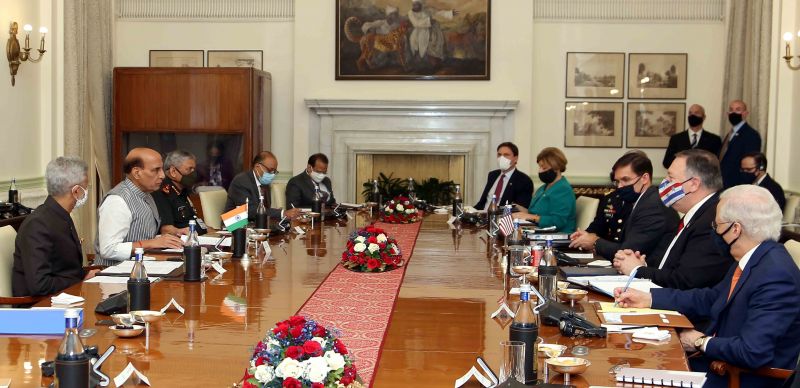Pakistan: Army Unlikely To Buckle
Brig N K Bhatia (Retd)

When a special court in Pakistan sentenced ex-President General Pervez Musharraf to death in December 2019 it crossed the Rubicon of keeping Pakistan’s defence forces and more particularly its Army from any scrutiny, much less than indicting one of its Chiefs on charges of treason. The death sentence was eventually overturned by Lahore High court a month later in January 2020. It was for the first time in the history of Pakistan that a military ruler had been indicted on charges of treason and convicted.
The credit for initiating the treason trial in 2013 was that of erstwhile Prime Minister Nawaz Sharif who had been in 1999 deposed by General Musharraf and immediately after reassuming office in 2013 had ordered arraignment of the erstwhile military dictator.
The indictment of General Pervez Musharraf may have only been ‘symbolic’ but a message had been conveyed that with some resolute will, the hegemony of Pakistan Army in state of affairs of Pakistan could not only be challenged but also be checked.
Mr Nawaz Sharif was unseated from his position through a Pakistan Supreme Court ordained case of corruption against him in 2017, which was seen as coming together of his political rival Imran Khan, piggybacking on the country’s military establishment. The election of 2018 anointing Imran Khan as “selected” Pakistan Prime Minister was seen as the revenge of its military hierarchy against Nawaz Sharif who had dared to challenge the hold of Generals on public policy and more importantly its foreign policy including relations with India.
After the removal of Prime Minister Nawaz Sharif, the Army Chief General Qamar Javed Bajwa, in March 2018 articulated his views on reshaping Pakistan’s polity by closely working with all, including political class, through what was revealed to be “Bajwa Doctrine”. The stated vision enunciated in the “Doctrine”, though well-intended, articulated a chasm on political and economic conditions of Pakistan and a wide difference in thinking between elected representatives and military leadership. It only reaffirmed that Pakistan’s Army would continue to actively involve itself in governance and policy issues in the foreseeable future, albeit in the shadows of an elected government.
The ‘quid pro quo’ of complicity between the Pakistan Chief of Army Staff and its protégée
Prime Minister Imran Khan was revealed in August 2019 through a public announcement to extend the tenure of the Pakistan Army Chief General Qamar Javed Bajwafor another three years. This was a clear case of an elected Prime Minister currying favour from the powerful military establishment to remain in power.
Over the two years of Imran Khan-led government, the space for governance has been slowly ceded back to General Bajwa led Army due to inability of the PTI government to address domestic as well as external issues. With food prices rising, there has been public unrest against the government. With high public debt and falling foreign reserves, the economic condition of Pakistan is precarious.
On the foreign policy front, the two years of Imran Khan Government have been disastrous. Its relationship with its biggest economic benefactor has turned sour after it threw its lot with Turkey. Its challenge to Saudi leadership to call for an OIC Summit on Kashmir Issue and threat to withdraw from it invited immediate Saudi response leading to the withdrawal of foreign aid and withdrawal of oil credit facilities. A rushed visit to Saudi Arabia by Pakistan’s Army Chief accompanied by ISI Chief was snubbed by Saudi leadership.
A precarious economic condition continues to push Pakistan into the arms of its “Iron Brother” China, more due to its inability to forge any worthwhile relationship with any other country. Chinese interest in Pakistan is primarily due to the China-Pakistan Economic Corridor (CPEC) project with nearly $62 billion Chinese loans and investment, and a key component of China’s Belt and Road Initiative (BRI). The CPEC touted as an economic miracle has brought about more economic mess and social unrest.
The CPEC was opposed by Imran Khan when he was in opposition but has been forced to fall in line at the behest of Pakistan’s COAS who has shown a soft corner for China ever since he assumed office. The promulgation of CPEC Authority Ordinance 2019, since expired, legitimised the role of Army to fast track projects under CPEC. As is common knowledge in Pakistan, the CPEC has only expanded avenues for high-level corruption, with the active participation of its Army, blunting efforts of Imran Khan-led government against corruption. Imran Khan government is since struggling to pass CPEC Authority Bill to streamline the functioning of CPEC.
Similarly, Pakistan’s doublespeak on terrorism and its active support to various terrorist outfits that it continues to nurture and the fund is exacerbating conflict and tension in within Pakistan and along its eastern and western borders. The world at large is by and large of its dubious credentials on this front and it continues to remain on Financial Action Task Force’s (FATF) grey list, despite latest Turkish attempts to support Pakistan’s stand-in latest FATF plenary session from 21 to 23 October 2020.
The coming together of Pakistan’s 11 opposition parties known as the Pakistan Democratic Alliance or PDM, points to an ensuing battle between political parties and the powerful Pakistan Army in the days ahead. The alliance includes four major opposition parties, the Pakistan Muslim League (Nawaz), Pakistan People’s Party, the JamiatUlema-e-Islam (Fazlur), and the Pakhtunkhwa Milli Awami Party, and a few minor parties, including the Baloch National Party and the Pashtun Tahaffuz Movement.
In the days ahead PDM plans to continue its three-phased anti-government movement under an “action plan” starting with countrywide public meetings, protest demonstrations and rallies before the final “decisive long march” towards Islamabad in January 2021 to oust the Imran Khan-led Pakistan Tehreek-e-Insaaf (PTI) government.
Most of the tirade in the three rallies so far, Gujranwala, Karachi and Quetta, has been against Pakistan Army’s interference and meddling in governance and trying to control all levers of power by sidelining democratic and civilian institutions.
The surprising part of discourse has been criticism of Army across the political spectrum, led by Nawaz Sharif, who has accused the army chief of rigging the July 2018 elections that brought Imran Khan to power. Mr Sharif’s insinuations and use of harsh words such as “traitors” have not been lost on anyone.
The aftermath of Karachi Rally saw the sordid drama being played out to arrest Captain Sarfdar Awan, husband of Mariam Nawaz. More importantly, it brought the role of the extended arm of Pakistan army, ISI into prominence to suggest the arrest was at its behest, to force Sind police to issue warrants of arrest against Captain Sarfdar Awan. The aftermath of arrest led to protest by the rank and file of Sind police leading to some back channel moves to set things in order and a call from Pakistan’s Army chief to Bilawal Bhutto and order an inquiry into the conduct of paramilitary force, to soothe the tempers, for time being.
For the time being, die has been cast, led by none other than Nawaz Sharif who has roots in Punjab, the most influential and prominent state of Pakistan, and from where the army also draws its major human resources.
The current challenge to the Army from a collective political leadership, led by Sharif have shaken the Army but may not be very effective to have much impact since he is out of power and facing numerous corruption charges in local courts. Addressing PDM rallies sitting cosily abroad with little chance of returning would dent his credibility to talk about corruption.
The shrill against the Army may remain one of the issues of opposition, but with little real impact.
The major impediment in opposition ranks would be the continued unity in the alliance. The political parties have had major political differences amongst themselves and are drawn from varied and opposing political ideologies. The political differences are unlikely to converge any time soon. The political parties by joining PDM may, for the time being, could be satisfying only their vote banks and constituencies to remain relevant. They are likely to go their way once elections are announced.
Pakistan’s elections are still close to three years away. Similarly, the tenure of present COAS tenure is secure till November 2022. The immediate fallout of political protests is unlike to have any major impact on Imran Khan-led government except his coming out more vigorously against his political opponents, in particular Sharif family.
The Pak Army image may appear dented in the near terms but any challenge to its dominance in state of affairs is farfetched. Since Pakistan’s independence, its Army leadership has cared little about public opinion. Its contempt for political leaders is even more.
The Army has, since the inception of Pakistan has set its national agenda with disastrous consequences. Beginning with the J&K tribal incursions in 1948 to two wars of 1965 and 1971 leading to its splitting into half, to the Kargil misadventure, its approach to the state of affairs has been calamitous. Similarly, its Kashmir policy and interference in politics through coups and dismantling of democratic institutions has proved ruinous for its polity. The Army has backed its political favourites to guide and interference in day to day governance of the country.
It is unlikely that Pakistan Army will let go of its exhaled position by ceding ground in internal as well as external affairs of the country any time soon, irrespective of the joint movement launched by 11 party PDM. When the time for next elections comes, it would be interesting to see which amongst the protesting political parties would be willing to break rank from PDM to for a ride to power with the backing of Pakistan Army.
*Author is an Indian Army veteran. Views expressed here are personal.



